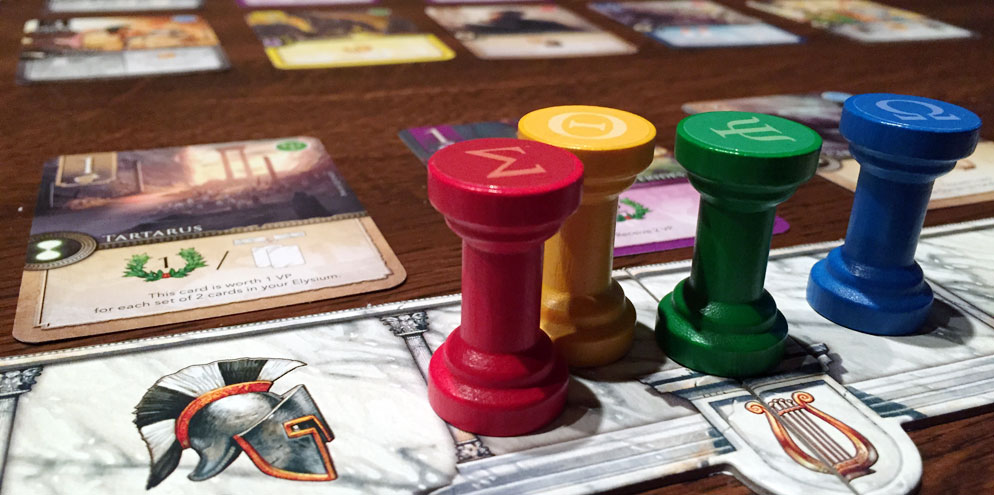 In 2014, new game publisher Space Cowboys rocketed onto the scene with the incredibly well received game Splendor (review here). This little gem won many awards, including our own BGQ Award for Best Family Game. Space Cowboys followed up Splendor with their pirate themed game Black Fleet (review here), which I actually liked more than Splendor.
In 2014, new game publisher Space Cowboys rocketed onto the scene with the incredibly well received game Splendor (review here). This little gem won many awards, including our own BGQ Award for Best Family Game. Space Cowboys followed up Splendor with their pirate themed game Black Fleet (review here), which I actually liked more than Splendor.
It’s 2015 now and the minds at Space Cowboys have finally given us their newest offering, Elysium. In this card drafting game, players take on the role of a Demigod who is trying to secure their place on Mt. Olympus. Will Elysium score this hot new game publisher a trifecta of fun games or have the finally made their first misstep. Let’s find out!
Elysium is a card drafting and set collection game for 2-4 players that takes about 60 minutes to play. Elysium plays best with 3-4 players.
Game Overview:
The goal in Elysium is to earn the most victory points. These are won though the legends players will assemble in their Elysium. The game itself is played over five Epochs (rounds) in which players will be drafting cards, writing legends, and using special powers.
During the game, players will have to make decisions both on which cards to draft, but also when to stop using their cards for powers and instead for victory points. At the end of the 5th epoch, the player with the most victory points will be the winner.
Game Components:
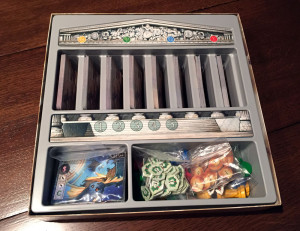
Looking at their previous two titles, it’s fairly clear that Space Cowboys knows what they are doing when it comes to publishing. Every one of their games has contained great components, amazing artwork, and a custom box insert.
I’m happy to report that Elysium follows that trend. The game comes with 8 different decks of cards, all fantastically illustrated with Greek mythological artwork. Each card contains both iconography and also explanation text, which helps make learning the game easy.
In addition to the cards, each player has 4 colored wooden columns and a cardboard player board. The columns also smartly come with stickers to be placed on top, to help people with color blindness.
The game also comes with various tokens and player aids that you might expect from a highly produced game. To follow along with their previous games, Elysium also includes a custom insert in the box to store all of your components.
How to Play:
Each game of Elysium uses 5 of the available 8 decks of god cards. The game has a recommended set for your first play, or you can just randomly choose 5 of them. Once those cards are shuffled, you are ready to begin.
Each player starts the game with a player board, 4 gold, a turn order marker (and VP tokens equal to the same), and 4 columns (one of each color).
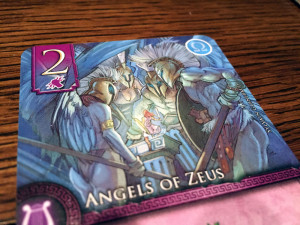
The game is divided into 5 Epochs, each of which has 4 phases:
Phase 1: Awakening – This is a setup phase where any old cards in the Agora (this is where players draft cards from) are removed and new ones are drawn (based on the amount of players).
Phase 2: Actions – In turn order (based on the player discs), each player MUST either draft one card from the Agora or take one Quest Tile.
To draft the card or quest tile, you must have a matching color column on your player board that is also shown on the card. You must remove one of your columns from your player board after you have taken a card (which is placed above your player board in your Domain). However you don’t have to remove the same color that you used to draft.
By the end of the 4 rounds of drafting, each player should have 3 family cards and 1 quest card. If you can’t take a card because you don’t have the appropriate color column anymore, then you take a citizen card instead. If you can’t claim a Quest Tile, then you take the last one left, but flip it over to its failed quest side. You’ll be going last next round and have fewer rewards.
Phase 3: Writing the Legends – During this phase, players reorder the player discs based on their new Quest Tiles. They will also possibly earn Victory Points, Gold, and the ability to transfer cards from their Domain to their Elysium.
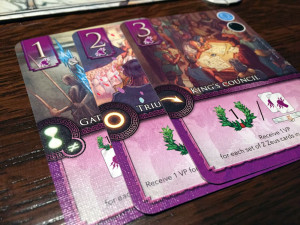
Each card in a players Domain allows the player to use the card’s special ability. During this phase, they can transfer cards down to their Elysium (below their player board). Doing so stops a player from being able to use the special power of the card, and instead it becomes worth victory points.
This is where the set collection aspect takes place. Cards are put into either families, in numerical order (1, 2 and 3), or levels (once card from each family of the same number). This is the main way to score victory points at the end of the game.
Phase 4: End of Epoch – This is a cleanup phase. Players place their columns back on their board, untap any used cards, and advance the Epoch marker one space. If this was the end of the 5th Epoch, the game proceeds to final scoring.
During final scoring, players gain Victory Points for cards in their Elysium, tokens earned, and possibly other items. The player with the most points is the winner.
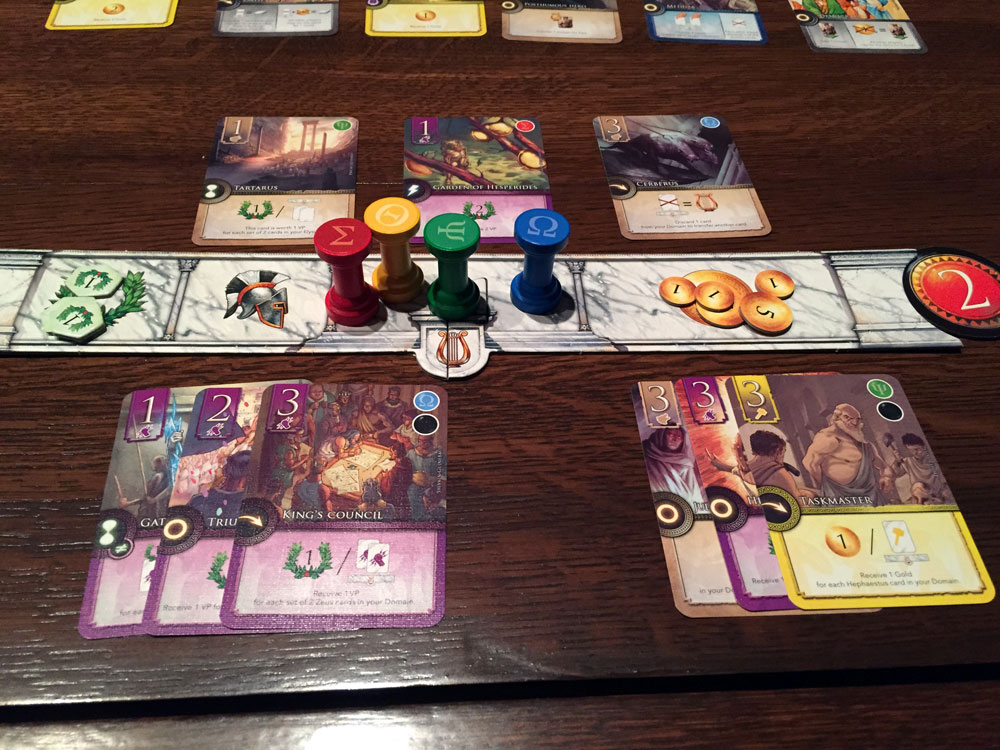
Game Experience:
Space Cowboys’s games have been hit or miss with me when it comes to the depth of their theme. Splendor was clearly a pasted on numbers game while Black Fleet felt like a fun romp around the Caribbean. Unfortunately when it comes with Elysium, it falls into the former category. As much as the rule book fills with you with texts of the struggle of the gods, and the inspiring artwork on the cards amazes you with heroic feats, there is really not much here to suck you in. Elysium quickly devolves into a numbers game as you start matching sets, moving columns, and paying for cards. This theme really could have been anything because at no point did I feel like a demigod fighting for my spot on Mt. Olympus.
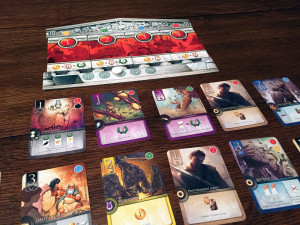
However, when it comes to decision making in the game, Elysium has that a plenty. From the cards you draft to when to transfer them, players will have lots of hard decisions to make throughout the game. This is especially true during Phase 3 when you have to start giving up those special powers you’ve been enjoying. With the exception of some card abilities, players will only have 5 chances to move cards down to their Elysium. If they don’t take advantage of that enough, they might be lacking when it comes time to score.
Which also brings me to one of the aspects of the game I wish was a bit deeper. I feel like Elysium wants to be an engine building game, but because you are transferring cards so frequently, and also how you are capped at drafting a max of 15 cards during the game, it feels like the game really never gets going in that department. Just as I start getting some nice combos in my Domain, I have to get rid of the cards or risk not scoring. This really felt a little disappointing especially because the family and level legend mechanic wasn’t all that exciting.
If you are a frequent reader of this site then you know I love me some card drafting games. From 7 Wonders to Sushi Go!, that’s one mechanic I can’t get enough of. Elysium is a bit different in that instead of drafting from a hand passed to you, you are drafting out of the center of the table. It has the bonus of allowing you full access to all the cards to tailor your strategy; however it also forces you to learn up to 13 cards at once. This means at the start of each Awakening phase, each player will be hunkered over the center of the table trying to read the small text on the cards. Sure there are icons, but unless you play Elysium a lot, don’t expect them to be super helpful.
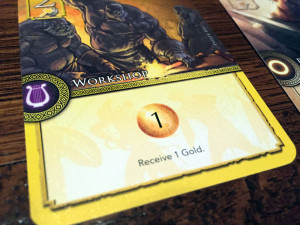
This is especially true because there are 8 different decks of cards in the game and you only ever play with 5 at a time. I do enjoy how this gives the game a lot of replay value as you can not only see new cards each time, but also experiment with how they interact with each other. I can only imagine that Space Cowboys will be working its way around the Greek Pantheon as it adds in expansion sets.
Finally, let’s talk about player scaling. Elysium definitely players better with the higher player counts, which 4 being my favorite. There are a couple of reasons why I didn’t enjoy the two player game. The first is the drafting of the Quest Tiles. In a two player game, it’s almost impossible to fail a quest unless you planned really poor. However, in a 4 player game it happens more often than you’d expect. This adds a nice bit of player interaction to the game where you can not only improve your position in the game, but also actively screw over your neighbor.
Secondly, you see almost twice as many cards in in the 4 player game as with two. Each of the families has 21 cards in their deck, making 105 cards in the draw deck for each game. With 4 players, you are drawing 13 cards each round, meaning players will see 65 of the cards during the game (more than half). With 2 players, you are only drawing 7 cards a round (35 in total). Not only does this make it harder to complete some of your legends, but also the variety suffers during the game. I played Elysium with 2 players once and that was enough for me. There are way better options out there at this player count.
Final Thoughts:
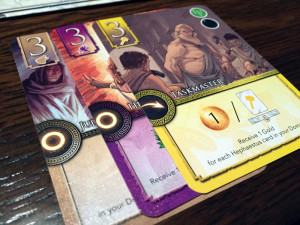
While I may have sounded a bit harsh in the game experience, I don’t think Elysium is a bad game. I was just expecting a bit more from it especially considering its publisher’s pedigree. While the game definitely has a pasted on theme and I want nothing to do with the 2 player experience, a 4 player game Elysium can still be a good amount of fun. There is a nice variety in the cards and each god has their own unique feel. You’ll find cards that range from ones that increase your position to attack cards to hurt your opponents.
However, plays looking for an epic struggle between Greek demigods are going to come away disappointed. The theme is a cool one, but there is not much here to tie it to the game.
If you are looking for a solid drafting game with a good amount of replay value, then you could have some fun with Elysium, especially if you play often with the 4 player count. For me though, Elysium ended up not being the next must own game from Space Cowboys. While Elysium is a solid game, unfortunately Space Cowboys newest title isn’t a “must own”.
If you’d like to pick up a copy of Elysium for yourself, you can get it for about $45.
Final Score: 3 Stars – A game that does a lot of things right, but ultimately is held back by its pasted on theme and mechanics that just aren’t as much fun as they could be.
 Hits:
Hits:
• Great components
• Lots of replay value
• Some unique mechanics
Misses:
• Pasted on theme
• Doesn’t play well with 2 players
• Mechanic of moving cards from Domain to Elysium just not fun.







